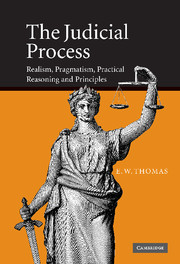Book contents
- Frontmatter
- Contents
- Preface
- 1 Introduction
- 2 Muddling along
- 3 The ‘curse’ of formalism
- 4 Legal fundamentalism
- 5 The idolatry of certainty
- 6 The piety of precedent
- 7 The foibles of precedent – a case study
- 8 There is no impersonal law
- 9 So, what is the law?
- 10 The constraints on the judiciary
- 11 Towards a new judicial methodology
- 12 Of realism and pragmatism
- 13 Of … practical reasoning and principles
- 14 Taking law seriously
- 15 A theory of ameliorative justice
- Subject index
- Authors index
13 - Of … practical reasoning and principles
Published online by Cambridge University Press: 15 July 2009
- Frontmatter
- Contents
- Preface
- 1 Introduction
- 2 Muddling along
- 3 The ‘curse’ of formalism
- 4 Legal fundamentalism
- 5 The idolatry of certainty
- 6 The piety of precedent
- 7 The foibles of precedent – a case study
- 8 There is no impersonal law
- 9 So, what is the law?
- 10 The constraints on the judiciary
- 11 Towards a new judicial methodology
- 12 Of realism and pragmatism
- 13 Of … practical reasoning and principles
- 14 Taking law seriously
- 15 A theory of ameliorative justice
- Subject index
- Authors index
Summary
Practical reasoning
The theory of practical reasoning
A commendable analysis of judicial reasoning has emerged passing under the name of ‘practical reasoning’. In general terms, practical reasoning is normally contrasted with deductive reasoning. It involves the ability to recognise suitable abstractions from particular instances. In a sense, it is a reverse of the traditionally perceived task of applying the general to the particular in that argument proceeds from particular instances of facts to general conclusions. It has been described as that capacity to choose between rules or to decide that no rule works well. Practical reason indicates that the instance connects with all the other instances of the rule, which its fits better than it connects with the instances of any other rule, or indicates that there are no such connections. In the latter case practical reason allows the court to develop a new rule.
The emergence or re-emergence of this line of thinking owes much to Professors McIntyre and Wellman. Professor McIntyre takes the view that the capacity of practical reasoning is not simply the capacity to follow rules but, rather, the capacity to act ‘with virtue’ when rules do not precisely define the right decision. In his thinking, as in mine, the virtue primarily represented in the decisions is ‘justice’. Professor Wellman examines the question of the dynamics of such a process: what leads to the development of a new rule? He considers that the answer lies in the perception of an ‘unsatisfactory’ result.
Information
- Type
- Chapter
- Information
- The Judicial ProcessRealism, Pragmatism, Practical Reasoning and Principles, pp. 316 - 348Publisher: Cambridge University PressPrint publication year: 2005
